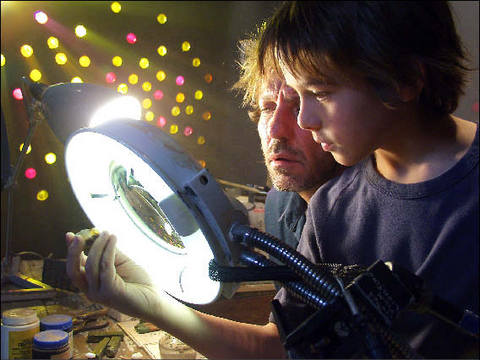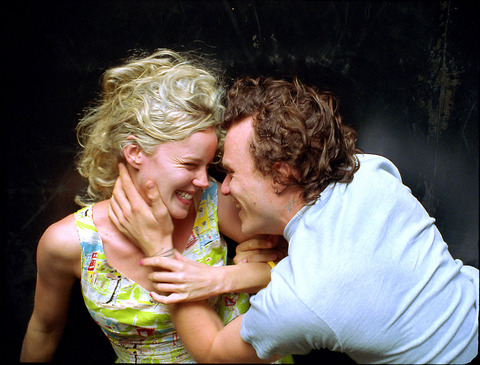Since cinema is commonly accepted to be the most direct media through which to understand a region's culture, sociopolitical setting and ways of life, over the last five years, the Australian Commerce and Industry Office (ACIO) in Taipei has facilitated cultural contact between the two countries through free packages of old Aussie movies supplied by Australia's Ministry of Foreign Affairs. But this year, they decided to take things into their own hands and showcase some new productions.
"We selected five new feature films [three of them are Taiwan premieres] that are both critically acclaimed and commercially successful so as to give local audiences the latest trend taking shape in Australian cinema," said Stephanie Tsai (蔡親儀) of ACIO's culture and media department. The films were also selected to provide something for audiences of different age groups.
Multiple award-winning film Look Both Ways and star-studded Candy are both geared to young adults. The debut of Sarah Watt, an acclaimed animation director, Look Both Ways blends live action and hand-drawn animation to tell an intelligent melodrama of three interconnected characters forced to come to terms with themselves after life-changing events that take place during a hot weekend.

PHOTOS COURTESY OF THE AUSTRALIAN COMMERCE AND INDUSTRY OFFICE
Taking a more sober look at life, Candy is a contemporary love story about two innocent lovers who spiral into heroin addication. The movie stars award-winning Abbie Cornish, Heath Ledger from Brokeback Mountain and Oscar winner Geoffrey Rush and portrays addicts as people who's will to make something wonderful happen from apparently dull lives ends up destroying them.
Leaving the city behind, The Oyster Farmer is an idiosyncratic story about a desperate young urbanite hiding among an oyster farming community on the Hawkesbury River and winding up falling for the lifestyle through a series of encounters with a group of eccentrics. Darkly humorous, the film is also a cinematographic achievement that breathes life into Australia's stunning landscape.
Fancy a touch of magic in a familiar setting? Opal Dream, Oscar-nominated British director Peter Cattaneo's screen adaptation of the much-loved children's book Pobby and Dingan, is about a little girl and her two imaginary friends. For those interested in the life of teenagers from a typical suburban Australian family, Hating Alison Ashley is a coming-of-age flick about a young girl going through all the hardships of high school: fitting in, hating relatives, having a crush on the school bad boy and competing with the perfect girl.

Apart from the new direction in programming, ACIO has teamed up with Eslite Bookstore for the first time to provide for this mini film showcase. And according to Tsai, If the format goes down well, Tsai said, then ACIO would introduce more new Australian works in the future.

That US assistance was a model for Taiwan’s spectacular development success was early recognized by policymakers and analysts. In a report to the US Congress for the fiscal year 1962, former President John F. Kennedy noted Taiwan’s “rapid economic growth,” was “producing a substantial net gain in living.” Kennedy had a stake in Taiwan’s achievements and the US’ official development assistance (ODA) in general: In September 1961, his entreaty to make the 1960s a “decade of development,” and an accompanying proposal for dedicated legislation to this end, had been formalized by congressional passage of the Foreign Assistance Act. Two

Despite the intense sunshine, we were hardly breaking a sweat as we cruised along the flat, dedicated bike lane, well protected from the heat by a canopy of trees. The electric assist on the bikes likely made a difference, too. Far removed from the bustle and noise of the Taichung traffic, we admired the serene rural scenery, making our way over rivers, alongside rice paddies and through pear orchards. Our route for the day covered two bike paths that connect in Fengyuan District (豐原) and are best done together. The Hou-Feng Bike Path (后豐鐵馬道) runs southward from Houli District (后里) while the

March 31 to April 6 On May 13, 1950, National Taiwan University Hospital otolaryngologist Su You-peng (蘇友鵬) was summoned to the director’s office. He thought someone had complained about him practicing the violin at night, but when he entered the room, he knew something was terribly wrong. He saw several burly men who appeared to be government secret agents, and three other resident doctors: internist Hsu Chiang (許強), dermatologist Hu Pao-chen (胡寶珍) and ophthalmologist Hu Hsin-lin (胡鑫麟). They were handcuffed, herded onto two jeeps and taken to the Secrecy Bureau (保密局) for questioning. Su was still in his doctor’s robes at

Mirror mirror on the wall, what’s the fairest Disney live-action remake of them all? Wait, mirror. Hold on a second. Maybe choosing from the likes of Alice in Wonderland (2010), Mulan (2020) and The Lion King (2019) isn’t such a good idea. Mirror, on second thought, what’s on Netflix? Even the most devoted fans would have to acknowledge that these have not been the most illustrious illustrations of Disney magic. At their best (Pete’s Dragon? Cinderella?) they breathe life into old classics that could use a little updating. At their worst, well, blue Will Smith. Given the rapacious rate of remakes in modern